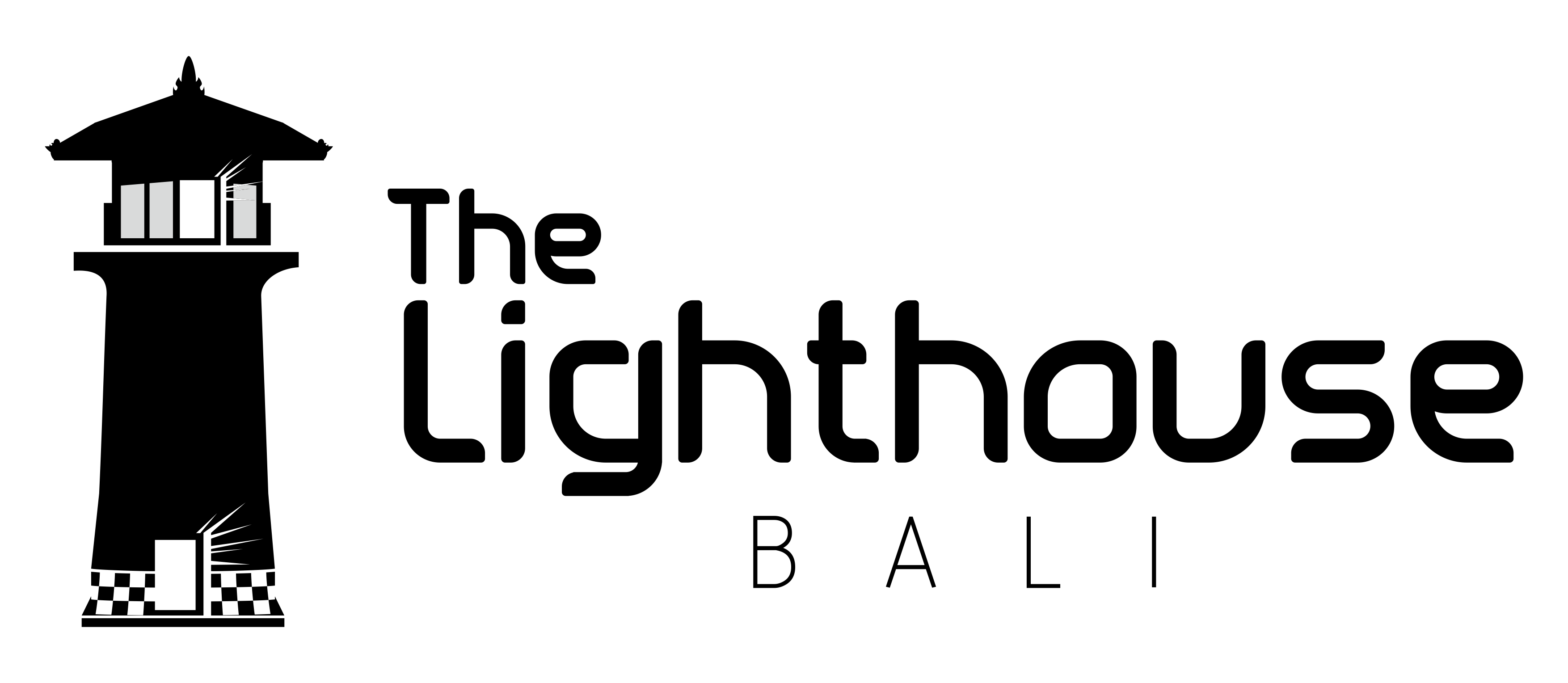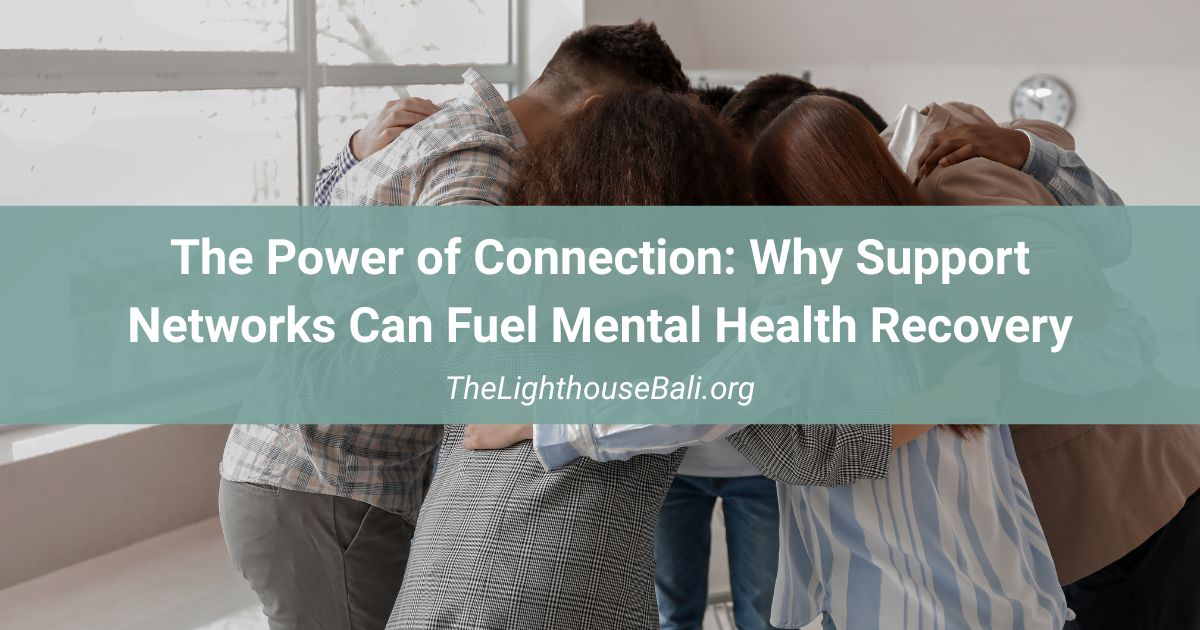
The Power of Connection: Why Support Networks Can Fuel Mental Health Recovery
As the age-old saying goes, “A problem shared is a problem halved.”
The above rings especially true for those in recovery, offering a sense of relief and comfort in knowing that you’re not alone in your struggles.
Whether you are navigating a mental health issue such as substance addiction, anxiety, or past trauma, a strong, supportive network of friends, family, and community can be instrumental in the healing process, allowing you to feel more grounded and in control during and after treatment.
This article explores the power of connection and how support networks can be invaluable for those in mental health recovery.
If you are concerned about your (or a loved one’s) mental health, rest assured that our team of multidisciplinary professionals is here to offer the help and support you may need.
We’re here to help you manage your symptoms and get your life back on track.
How We Can Help
The Lighthouse Bali provides personalized, one-on-one treatment to individuals struggling with a range of emotional issues, including anxiety, depression, substance abuse and trauma.
Our services include individual treatment, medical detox, trauma-informed therapy, a sober companion service and aftercare support, all delivered by our team of experienced professionals.
This approach takes into account not just the psychological symptoms of your condition but also your overall well-being, including your physical health, trauma history, and treatment goals.
The Lighthouse Bali offers a well-rounded, root-cause-focused treatment experience at our inpatient facility in Sanur, which includes:
- Behavioral therapy, such as Cognitive Behavioral Therapy (CBT) and Dialectical Behavior Therapy (DBT), can help you explore and modify unhelpful thought and behavior patterns that may cause or exacerbate your mental health struggles.
- Trauma-informed treatment, including EMDR (Eye Movement Desensitization Reprocessing) and Schema Therapy. These treatments can help you reprocess past traumatic experiences that may have been stored in your body and nervous system, allowing you to challenge any negative thoughts and beliefs about your experiences so that you can put the past behind you in a safe and empowering way.
- Bespoke Premium Primary Inpatient Addiction Programs. For those struggling with substance addiction, such as alcohol or drug abuse, our programs provide a range of evidence-based treatments and approaches, such as medical detox and counseling, to help you abstain from substances and avoid relapse.
- Experiential treatments such as yoga and mindfulness help recalibrate your nervous system, allowing you to feel more balanced and connected to your body and surroundings.
- Sober companion service. When you engage with our sober companion services, we take the time to understand your unique needs and personal circumstances. Following comprehensive medical and psychological assessments, we carefully pair you with a companion who best aligns with your journey to recovery. Your dedicated sober companion is selected based on their expertise, experience, and personality, ensuring they can provide the right level of support and guidance. This service is particularly beneficial for clients experiencing anxiety about an upcoming substance abuse detox and withdrawal, offering reassurance and stability during this critical phase of recovery.
- Aftercare support programs are an integral part of our services. These programs help you stay on track with your recovery by giving you the tools and support to manage any cravings or triggers that may arise after inpatient treatment. Our aftercare support includes regular check-ins, access to support groups, and assistance in finding local resources for continued care.
Contact our professional team today to learn more about how we can help you feel better and regain control over your life.
Our multidisciplinary team can help guide you through the process and answer any questions you may have, making the journey to recovery as smooth and stress-free as possible.
You are not alone. Help and support are just a phone call away.

The Power of Connection: Why Support Networks Can Fuel Mental Health Recovery
It is a universal truth that support networks can offer an abundance of positive outcomes for those in mental health recovery.
As broad as the term may sound, mental health can cover a spectrum of different challenges, including anxiety disorders, PTSD (post-traumatic stress disorder), depression, and alcohol and drug use disorders, to name just a few.
However, regardless of your unique struggles, cultivating a healthy group of friends, family, and community can help you feel less isolated and alone, offering an oasis of strength and encouragement – all of which are vital aspects of long-term recovery.
Such networks play a crucial role in providing a sense of stability and support during times of change and uncertainty.
Knowing someone is there to listen or offer support can significantly lighten the emotional load, cultivating a sense of security that empowers you to move forward.
Compassionate support systems help build the confidence needed to navigate the challenges of recovery, reassuring individuals that they are not alone in their journey.
Below are some practical ways that support networks can help fuel mental health recovery.
1. Support Networks Offer a Sense of Connection for Those in Substance Abuse Recovery
Consider someone overcoming a substance use disorder like alcohol or drug addiction.
Here, the importance of community cannot be overstated.
Involvement with Twelve step or other support groups, as well as “giving back” and helping others are typically practiced by those with solid recovery programs.
Interestingly, the main takeaway of the Better than Well Study found that people in long-term recovery report better quality of life than the general population average.
Social and psychological domains were particularly improved.
Rehabilitation centers and inpatient treatment facilities like ours understand that lasting sobriety is inherently rooted in connection – finding guidance, encouragement, and shared experience in those who have walked a similar path as you.
Hearing others voice similar struggles is a powerful reminder that you are not alone and can help foster a profound sense of understanding and empathy that enables you to feel seen and validated, serving as an emotional anchor during times of struggle or worry.
Sober Companion Services
Support systems, including sober companion services like those offered at The Lighthouse Bali, can help keep you stay accountable in moments of vulnerability.
For example, our sober companions offer continuous guidance, ensuring you stay committed to your recovery goals while navigating daily challenges in a healthy, functional way.
This service is designed to offer emotional support and encouragement while ensuring you take personal responsibility for your unique substance abuse recovery journey.
Click here to learn more about our sober companion service.

2. Support Networks Can Help Reduce Mental Health Stigma
Although we have come a long way in reducing the stigma associated with mental health conditions like depression, anxiety and even substance addiction, we still have some way to go.
Individuals grappling with mental health issues often find themselves feeling isolated and ashamed about their experiences.
Because of this, it can prove challenging for them to seek the help and support they need to feel better and recover.
Support groups provide a nurturing foundation for healing where individuals can share their experiences without feeling ashamed, judged or ridiculed.
Mental health disorders like depression and anxiety often engulf people in a fog of isolation and withdrawal, blocking out the light they need to envision a brighter, more hopeful future.
Having a sense of connection through a robust support network allows the light to shine brightly through the cracks, offering individuals new, healthier perspectives and relief.
Relational dynamics that are open and honest can help break the stigma associated with poor mental health, replacing shame and isolation with acceptance and shared connection.
3. Practical Support and Guidance
As well as offering emotional guidance, support networks provide practical strategies and techniques to help you manage your mental health and avoid relapse.
For instance, you may ask a sensible friend to accompany you to your therapy sessions.
You may also ask a family member to help you out with daily tasks such as grocery shopping or driving the dog to the vet.
For those in addiction recovery, individuals may call their sponsor , mentor or sober companion to guide them through a difficult or triggering moment.
Each individual will have different needs and preferences for the type of practical support they require during recovery, but the key here is to draw on your support system instead of trying to do everything on your own.
4. Support Networks Encourage You to Celebrate Milestones and Achievements
Recovery is just as much about celebrating milestones as overcoming obstacles and challenges. Many acknowledge the latter but not so much the former.
However, trauma experts say that celebrating your recovery milestones and achievements is an integral part of the healing process and must not be overlooked.
Remember, your support system is just as pivotal in moments of celebration as it is in moments of crisis.
Those in recovery often celebrate length of time milestones such as 24 hours, 30 days, 60 days, 90 days, 6 months, 9 months and years of recovery. Many 12 step fellowships give tokens or “coins” that represent these lengths of sobriety.
So, make sure you celebrate your wins and any progress you have made along the way, no matter how big or small.

The Bottom Line
Recovery, whether from addiction, anxiety, depression or other mental health challenges can be a complex, multifaceted journey that must not be taken alone.
Having a strong support system of community, family, and friends can be the difference between struggling in isolation and finding the courage and strength to heal and, eventually, thrive.
Inherently, we need others to help us see the very things our symptoms may prevent us from seeing.
For instance, those struggling with alcoholism may find comfort and inspiration in the stories of others who have walked the same path.
By doing so, they can learn helpful techniques and coping skills to help them manage triggers they may not have discovered without such networks.
On the other hand, individuals grappling with lifelong anxiety may learn, through their support network, just how common their symptoms are, reducing the shame and isolation often associated with this condition.
You cannot see the picture when you’re in the frame.
However, with the help of others, you can begin to reframe your emotional challenges in new, more empowering ways, enabling you to find recovery once and for all.
Seeking Professional Help and Support
Seeking professional help and support may sound like the obvious solution when confronted with mental health challenges.
However, it is often the obvious things we overlook or dismiss, particularly when unpleasant symptoms like trauma and anxiety cloud our ability to make healthy, well-thought-out decisions.
No matter what difficulties you might be facing, seeking the help of a mental health professional allows you to make sense of your symptoms and experiences and, ultimately, enables you to feel more empowered as you take control of your health.
Finding Recovery at The Lighthouse Bali
At The Lighthouse Bali, we understand the power of a strong support system.
As an integral part of our recovery program, our sober companion service provides personalized, one-on-one support to help you navigate the complexities of recovery with confidence and stability.
Whether you need short-term guidance or long-term assistance, we are here to walk with you every step of the way.
Contact our professional team today to begin your journey to better mental health and experience the power of connection.
We are here and ready to help.
Learn More
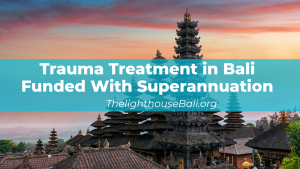
Trauma Treatment in Bali Funded With Superannuation
Trauma treatment in Bali offers a peaceful environment and intensive, personalized programs that support recovery from PTSD and emotional trauma. Superannuation can often be accessed early on compassionate grounds to help fund this treatment when public services cannot provide the required level of care.
At The Lighthouse Bali, clients receive evidence-based therapies, holistic healing, and private accommodation, along with full support throughout the Superannuation application process. With the right professional guidance, meaningful trauma recovery is fully achievable, and early access to super can make high-quality treatment more accessible.
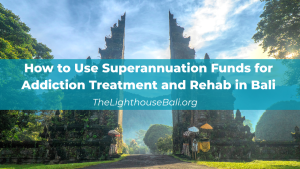
How to Use Superannuation Funds for Addiction Treatment and Rehab in Bali
Accessing your Superannuation to fund addiction treatment is an investment in your health, future, and freedom.
At The Lighthouse Bali, we specialise in helping Australians release their Super with ease, ensuring the process is fast, compliant, and stress-free.
Our team in Australia can guide you through every step from eligibility to approval, so you can begin your personalised recovery journey in Bali with confidence and peace of mind.
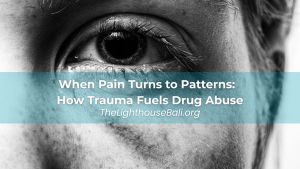
When Pain Turns to Patterns: How Trauma Fuels Drug Abuse
When pain goes unhealed, it often turns into patterns that shape how we live, think, and cope. For many, those patterns lead to substance use as a way to escape emotional wounds. This piece explores how trauma fuels addiction—and how healing both together can open the door to genuine recovery and lasting peace.
